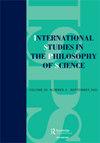The Selective Confirmation Answer to the Paradox of the Ravens
IF 0.8
2区 哲学
Q2 HISTORY & PHILOSOPHY OF SCIENCE
International Studies in the Philosophy of Science
Pub Date : 2019-10-02
DOI:10.1080/02698595.2020.1768014
引用次数: 1
Abstract
ABSTRACT Philosophers such as Goodman (1954), Scheffler (1963) and Glymour (1983) aim to answer the Paradox of the Ravens by distinguishing between confirmation simpliciter and selective confirmation. The latter evidential relation occurs when data not only confirms a hypothesis, but also disconfirms one of its ‘rival’ hypotheses. The appearance of paradox is allegedly due to a conflation of valid intuitions about selective confirmation with our intuitions about confirmation simpliciter. Theories of evidence, like the standard Bayesian analysis, should only be understood as explications of confirmation simpliciter; when we disambiguate between selective confirmation and confirmation simpliciter, there is no longer a paradox from these theories. Bandyopadhyay and Brittan (2006) have revived this answer within a sophisticated Bayesian analysis of confirmation and severe testing. I argue that, despite the attractive features of the Selective Confirmation Answer, there is no analysis of this evidential relation that satisfactorily answers the Paradox of the Ravens, and the prospects for any answer along these lines are bleak. We must look elsewhere.乌鸦悖论的选择性确认答案
古德曼(1954)、舍弗勒(1963)和格里莫(1983)等哲学家试图通过区分简单确认和选择性确认来回答乌鸦悖论。后一种证据关系发生在数据不仅证实了一个假设,而且也否定了其“竞争”假设之一的情况下。据称,悖论的出现是由于关于选择性确认的有效直觉与我们关于简单确认的直觉的合并。证据理论,就像标准的贝叶斯分析一样,只应该被理解为更简单的确认的解释;当我们在选择性确认和简化确认之间消除歧义时,这些理论不再存在悖论。Bandyopadhyay和Brittan(2006)通过一种复杂的贝叶斯确认分析和严格的测试,重新提出了这个答案。我认为,尽管选择性确认答案具有吸引人的特点,但没有对这种证据关系的分析能令人满意地回答乌鸦悖论,而且沿着这些思路找到任何答案的前景都是黯淡的。我们必须另寻他处。
本文章由计算机程序翻译,如有差异,请以英文原文为准。
求助全文
约1分钟内获得全文
求助全文
来源期刊

International Studies in the Philosophy of Science
HISTORY & PHILOSOPHY OF SCIENCE-
自引率
12.50%
发文量
10
期刊介绍:
International Studies in the Philosophy of Science is a scholarly journal dedicated to publishing original research in philosophy of science and in philosophically informed history and sociology of science. Its scope includes the foundations and methodology of the natural, social, and human sciences, philosophical implications of particular scientific theories, and broader philosophical reflection on science. The editors invite contributions not only from philosophers, historians, and sociologists of science, but also from researchers in the sciences. The journal publishes articles from a wide variety of countries and philosophical traditions.
 求助内容:
求助内容: 应助结果提醒方式:
应助结果提醒方式:


